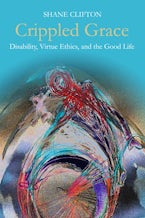The disability movement has properly chided social structures as well as individuals regarding a common myopia: we see partially. This book furthers that cause by probing the interstices of suffering, pain, rage, and disabled sexuality, carrying us into grace, forgiveness, and the happiness that accompanies virtue. Every page bears moving accounts of and trenchant insights into human life stripped bare of pretentious prettiness to give us not only hope and courage but the wisdom for rich, full living and for the flourishing of the communities to which we all contribute. It is an honor to be in the author’s company. Crippled Grace is simply masterful must-reading for those who suffer or care for those who do.
~Ellen T. Charry, Margaret W. Harmon Professor of Systematic Theology, Princeton Theological Seminary
In Crippled Grace: Disability, Virtue Ethics, and the Good Life, Shane Clifton invites readers to ponder what it means to flourish with disability. Using virtue ethics and positivist psychology as explanatory tools, he argues for the transformative power of disability to create flourishing lives, well-lived in love, inter-connectedness, and community. Through his own story and those of others, he brings insider narratives and scholarly argument to demolishing stereotypes of disability as great burden or super-worldly heroics. This book brings a deeper understanding of what it means to live the good life; it deserves to become required reading for all health and social care professionals.
~Gwynnyth Llewellyn, Director, Centre for Disability Research, The University of Sydney
Crippled Grace accomplishes something many people assume could never be done: it offers a theological account of virtue theory adequate for those with disabilities. By weaving together narratives from a range of Christians who are also disabled, Clifton develops a rounded and theological account of human flourishing that also includes the life-experiences of people with disabilities. It is a substantial contribution to the theological literature on disability, and is especially important for its detailed engagement with the philosophical, ethical, and practical implications of paralysis.
~Brian Brock, Reader in Moral and Practical Theology, University of Aberdeen
Crippled Grace is a wide-ranging reflection on the issues surrounding disability and flourishing. Clifton boldly asks the difficult and confronting questions, recognising his limitations and being prepared to not have comprehensive answers, while still setting a solid framework for understanding the dynamics of flourishing and challenges and issues that are presently hindering it for the disabled community. Paragraph after paragraph the work continues to offer wisdom and insight as Clifton shows a comprehensive awareness of the relevant ethical, practical and theological concerns.
~Christopher Car, Journal of Contemporary Ministry
This book deserves to be read by anyone interested in the fragility of the human condition and the hope God’s grace gives.
~Choice
[Clifton] also manages to combine personal honesty with sophisticated reflection, a feat too rare in academic theology today. This is truly a book all who want to work in theology and disability should read, because it is thoughtful, brutally honest, deeply reflective, and methodologically sophisticated.
~Aaron Klink, Reading Religion
Clifton has convinced me that what my congregation needs is not wheelchair ramps and ADA-approved restrooms so much as a wrecking ball taken to its Sunday-best pretenses.... Crippled Grace helps us see, regardless of ability, that this sort of frank admission of brokenness—and a candid willingness to be dependent upon God or others—is the path to happiness.
~Jason Micheli, The Christian Century
Clifton forges into new territory and produces perhaps the most thorough work by a Pentecostal scholar on disability and suffering and surely the most important work on this topic since Amos Yong’s Theology and Down Syndrome (Baylor University Press, 2007). I heartily endorse this work as a primary textbook for disability studies, ethics, and human relationships, as well as secondary and recommended reading for Pentecostal-specific courses with emphases upon healing, prophetic justice, suffering, and practical theology. This work also deserves a wide readership among pastors, particularly those engaged in pastoral care, and all readers interested in ministry to, from, and with our friends in the disability community.
~Martin W. Mittelstadt, Pneuma: The Journal of the Society for Pentecostal Studies
Crippled Grace belongs in our library of ethics as envisioned by disabled people – exemplifying how disabled people actively develop and enact virtues for living a good life specific to our realities.
~Alise de Bie, Disability and Society
Clifton opens up important paths for further consideration, not least his provocative discussion of sexual personhood, while incorporating elements such as human vulnerability, human agency, and the experience of alienation that must be central to any disability theology.
~Wen-Pin Leow, International Journal of Public Theology

